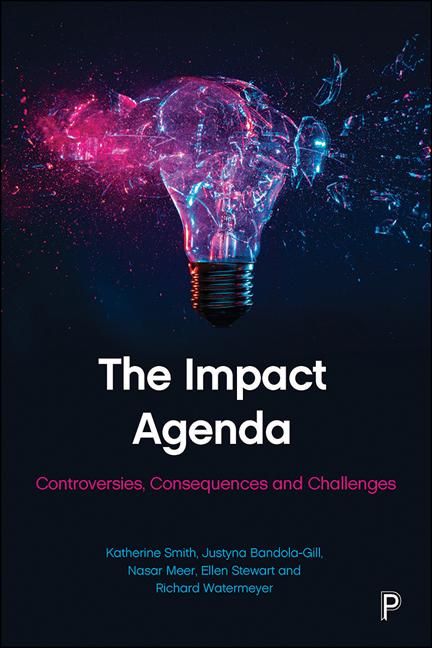Book contents
- Frontmatter
- Contents
- List of figures, tables and boxes
- List of abbreviations
- Notes on authors
- Acknowledgements
- 1 Introduction: Critical Reflections on Research Impact
- 2 The Rise of Research Impact
- 3 Debating the UK Impact Agenda
- 4 Do Experiences and Perceptions of Research Impact Vary by Discipline?
- 5 Impact on whom? Contrasting Research Impact with Public Engagement
- 6 Public Intellectualism and the Impact Agenda: International Perspectives
- 7 Academic Life in the Impact Vanguard: The View from Knowledge Exchange Organisations
- 8 Looking Back: Evolving Public Health Perspectives on Research Impact
- 9 Telling Tales of Impact: As Seen Through the Eyes of User Assessors
- 10 Conclusion: What Would an Evidence-Informed Impact Agenda Involve?
- References
- Index
10 - Conclusion: What Would an Evidence-Informed Impact Agenda Involve?
Published online by Cambridge University Press: 23 February 2021
- Frontmatter
- Contents
- List of figures, tables and boxes
- List of abbreviations
- Notes on authors
- Acknowledgements
- 1 Introduction: Critical Reflections on Research Impact
- 2 The Rise of Research Impact
- 3 Debating the UK Impact Agenda
- 4 Do Experiences and Perceptions of Research Impact Vary by Discipline?
- 5 Impact on whom? Contrasting Research Impact with Public Engagement
- 6 Public Intellectualism and the Impact Agenda: International Perspectives
- 7 Academic Life in the Impact Vanguard: The View from Knowledge Exchange Organisations
- 8 Looking Back: Evolving Public Health Perspectives on Research Impact
- 9 Telling Tales of Impact: As Seen Through the Eyes of User Assessors
- 10 Conclusion: What Would an Evidence-Informed Impact Agenda Involve?
- References
- Index
Summary
Summing up our findings
This book has drawn on a wide range of qualitative data to explore how the UK's approach to research impact is playing out. It started by outlining the policy changes that had informed, and culminated in, the current approach to research impact (Chapter 2) and by outlining the various arguments for, and concerns about, the consequences of this approach (Chapters 1 and 3). In Chapter 3, we grouped issues raised in existing literature into ten key concerns. These ranged from the fundamental (is it possible to meaningfully demonstrate, measure and attribute research impact? What are the theoretical foundations of the UK's approach to research impact and how do these accord with relevant scholarly literature? Does the UK's approach to research impact restrict academic freedom/autonomy and/or misleadingly assume research impact to be always positive?) to the more prosaic and pragmatic (do incentives for academics to demonstrate research impact risk activities which will further overload external audiences with information? Is the seemingly arbitrary time limit appropriate or restrictive? What are the costs of assessing research impact and do these represent value for money? Does the current approach reify individual working and traditional elites?). Much of the literature informing this chapter sketched out theoretical concerns or identified issues in how research impact was affecting specific areas of scholarly work. This book builds on these existing contributions by taking an empirically grounded, in-depth exploration of how relevant groups (particularly academics working in the UK but also impact assessors, funders and academics working elsewhere) view the UK experiment with research impact. While our own social science grounding and outlook has inevitably informed the focus of our data and analysis (including, perhaps most notably, a recurrent focus on policy and practice as key ‘targets’ of research impact efforts), collectively our data map across a wide range of academic disciplines.
Our findings, like the existing literature, paint a complex and varied picture. There is no doubt that contrasting views exist about the UK's approach to research impact, within and beyond the UK, and that these are often strongly held.
- Type
- Chapter
- Information
- The Impact AgendaControversies, Consequences and Challenges, pp. 195 - 204Publisher: Bristol University PressPrint publication year: 2020



